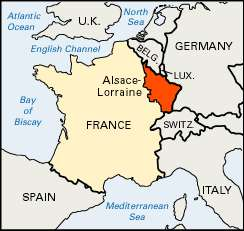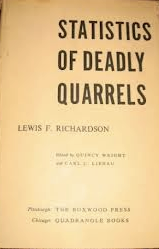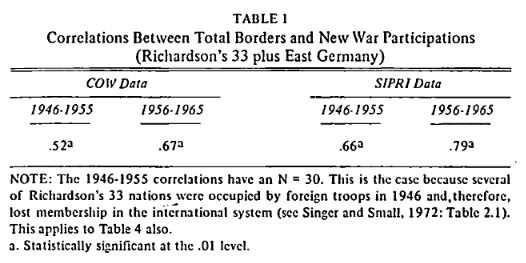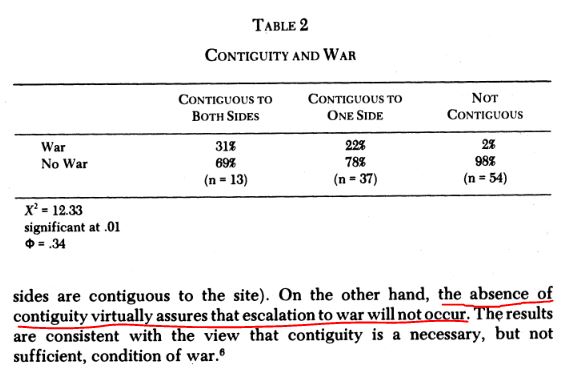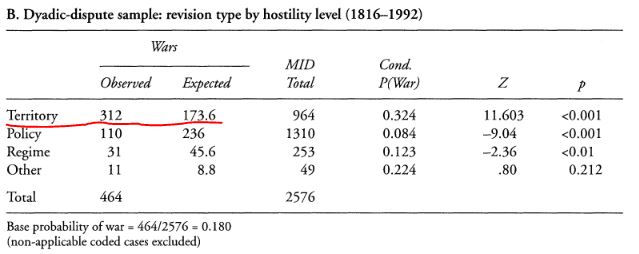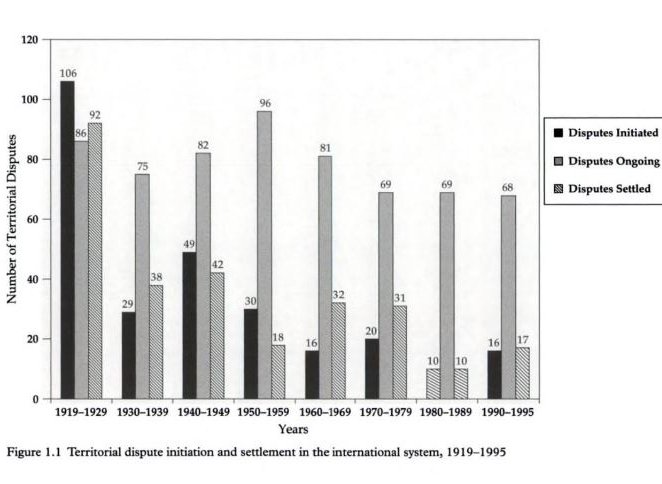While  https://abs.twimg.com/emoji/v2/... draggable="false" alt="🇮🇳" title="Flagge von Indien" aria-label="Emoji: Flagge von Indien">-
https://abs.twimg.com/emoji/v2/... draggable="false" alt="🇮🇳" title="Flagge von Indien" aria-label="Emoji: Flagge von Indien">- https://abs.twimg.com/emoji/v2/... draggable="false" alt="🇨🇳" title="Flagge von China" aria-label="Emoji: Flagge von China">border clash is garnering attention, disputes over territory are widespread.
https://abs.twimg.com/emoji/v2/... draggable="false" alt="🇨🇳" title="Flagge von China" aria-label="Emoji: Flagge von China">border clash is garnering attention, disputes over territory are widespread.
With all due respect to the "Democratic Peace", the true "closest thing to an empirical law" in international politics is "Territorial Dispute -> War"
[THREAD] https://twitter.com/drkristawiegand/status/1273242433904619520">https://twitter.com/drkristaw...
With all due respect to the "Democratic Peace", the true "closest thing to an empirical law" in international politics is "Territorial Dispute -> War"
[THREAD] https://twitter.com/drkristawiegand/status/1273242433904619520">https://twitter.com/drkristaw...
What do we mean by a territorial dispute?  https://abs.twimg.com/emoji/v2/... draggable="false" alt="🇮🇳" title="Flagge von Indien" aria-label="Emoji: Flagge von Indien"> offers several examples (which is perhaps why @pstanpolitics has a popular class on the international security of South Asia)
https://abs.twimg.com/emoji/v2/... draggable="false" alt="🇮🇳" title="Flagge von Indien" aria-label="Emoji: Flagge von Indien"> offers several examples (which is perhaps why @pstanpolitics has a popular class on the international security of South Asia)
Such disputes have long garnered the attention of international relations scholars.
Why?
Think back to the territorial disputes that existed in Europe on the verge of World War I, such as Alsace-Lorraine
Why?
Think back to the territorial disputes that existed in Europe on the verge of World War I, such as Alsace-Lorraine
As the discipline began to collect systematic data on war, disputes over territory became an immediate focus.
In particular, Richardson (1960) found that the # of frontiers a nation possessed was linked to its participation in war.
In particular, Richardson (1960) found that the # of frontiers a nation possessed was linked to its participation in war.
Then in the mid-1970s, Starr and Most reevaluated Richardson& #39;s finding https://journals.sagepub.com/doi/abs/10.1177/002200277802200306?casa_token=aI3I6SKNeAwAAAAA:Re3Kb6bzR-Fx7udhqU_RE9Hgjv8OfYAq-g--MWBISzWebrNNJtQQGuy8SaIaCseuuX0I99C3qnQ">https://journals.sagepub.com/doi/abs/1...
They found that the "borders->war" relationship generally holds (though they do add some qualifications, such as colonial borders being a major driver of Richardson& #39;s findings)
In the early 1980s, Paul Diehl took the analysis further by evaluating shared borders between major power rival "dyads" (i.e. state-to-state pairs)
https://www.journals.uchicago.edu/doi/abs/10.2307/2130814">https://www.journals.uchicago.edu/doi/abs/1...
https://www.journals.uchicago.edu/doi/abs/10.2307/2130814">https://www.journals.uchicago.edu/doi/abs/1...
Yep, "dyads" matter!
https://twitter.com/abhworthington/status/1272957958108954627">https://twitter.com/abhworthi...
https://twitter.com/abhworthington/status/1272957958108954627">https://twitter.com/abhworthi...
More precisely, Diehl& #39;s finding is pretty strong (underlined in red): unlikely to have a war if their is no shared border
Subsequent work sought to refine the analysis by looking at actual disputes over territory (i.e. when the two states didn& #39;t just share a border, but had disagreement over who possessed the territory)
A good example is Holsti& #39;s 1991 book https://www.google.com/books/edition/Peace_and_War/XeRWvk3TP_gC?hl=en&gbpv=1&printsec=frontcover">https://www.google.com/books/edi...
Holsti coded the various issues that led states to go to war. Most notably, he found that territorial issues were the main culprit (though, of course, there is some selection on the dependent variable here)
Other notable examples include the work of Vasquez, with two @JPR_journal papers...
...here... https://journals.sagepub.com/doi/abs/10.1177/0022343395032003003?casa_token=hRH8sDZX0A4AAAAA:zsx5Fo_rPAGkdPbEnbFICjRHgmNLrdXNbCbs4RUsmfodcEpDNxnQCt4wEhOfFNu4gvKW6CPwJQw">https://journals.sagepub.com/doi/abs/1...
...and here. https://journals.sagepub.com/doi/10.1177/0022343301038002001">https://journals.sagepub.com/doi/10.11...
The second Vasquez paper uses data on the "revisionist goals" of states and finds that "territorial goals" are DRAMATICALLY likely to lead to war.
This brings us to the Huth and Allee book published in 2002. As you can tell by the title, it sought to link together two strong findings in quantitative international relations: the democratic peace and the territory-war link: #v=onepage&q&f=false">https://books.google.com/books?hl=en&lr=&id=blrS9ETGaIEC&oi=fnd&pg=PR10&dq=info:CMazWqCeN5IJ:scholar.google.com&ots=9JxBPnJybs&sig=Jpcoy4Ae0vd8xuIaGgN7t1p-YKk #v=onepage&q&f=false">https://books.google.com/books...
A key contribution was the data that Huth and Allee collected on territorial disputes from 1919 to 1995.
For the next twenty years, research made use of the Huth and Allee data to continue validating and extending the territory-war link.
Examples include...
Examples include...
...@drkistawiegand (in @JPR_journal) showing how territorial disputes can help scholars explore "resolve" (itself, a whole OTHER issue)... https://journals.sagepub.com/doi/full/10.1177/0022343310389414?casa_token=AlANHyqqk8oAAAAA%3AQY9pN4KEHn2_Grgwp7yHoK1UILhkc1j7_gv32IObxEGbEfI_IKxWc0JUbHRyrsdbqC1eXhN-0nQ">https://journals.sagepub.com/doi/full/...
... @dmgibler (in @ISQ_Jrnl) using territorial disputes to raise fundamental questions about the democratic peace... https://academic.oup.com/isq/article-abstract/51/3/509/1794769">https://academic.oup.com/isq/artic...
... @tanishafazal (in @IntOrgJournal) showing that the most violent territorial wars tended to involve "buffer states"... https://www.cambridge.org/core/journals/international-organization/article/state-death-in-the-international-system/293E2E30C054DEE72899DAAA643B61AD">https://www.cambridge.org/core/jour...
... @daltman_IR (in @ISQ_Jrnl) showing that states try to avoid war by quickly moving forces to grab small pieces of land... https://academic.oup.com/isq/article-abstract/61/4/881/4781720">https://academic.oup.com/isq/artic...
... @hgoemans & David Carter (also in @IntOrgJournal) showing that it is really about border placement criteria, not large swaths of land, that create conditions for conflict ... https://www.cambridge.org/core/journals/international-organization/article/making-of-the-territorial-order-new-borders-and-the-emergence-of-interstate-conflict/AD04BBC4F84CFE6AF8D30647C0D536A2">https://www.cambridge.org/core/jour...
...or  https://abs.twimg.com/emoji/v2/... draggable="false" alt="🙋♂️" title="Happy man raising one hand" aria-label="Emoji: Happy man raising one hand">and David Carter (in JCR) showing that states appear to be replacing the military revision of borders with the fortification of borders. https://journals.sagepub.com/doi/full/10.1177/0022002715596776?casa_token=PEzz4Xia8IAAAAAA%3AQy58wxO7Osf5gJTLS3HfkIJr0P4wlE50T89HKHDEmfVUebJdEjrRvSgn8ZGo6uBvj7G4-Xis-a4">https://journals.sagepub.com/doi/full/...
https://abs.twimg.com/emoji/v2/... draggable="false" alt="🙋♂️" title="Happy man raising one hand" aria-label="Emoji: Happy man raising one hand">and David Carter (in JCR) showing that states appear to be replacing the military revision of borders with the fortification of borders. https://journals.sagepub.com/doi/full/10.1177/0022002715596776?casa_token=PEzz4Xia8IAAAAAA%3AQy58wxO7Osf5gJTLS3HfkIJr0P4wlE50T89HKHDEmfVUebJdEjrRvSgn8ZGo6uBvj7G4-Xis-a4">https://journals.sagepub.com/doi/full/...
Still other scholars sought to reconsider and re-collect the data on territorial disputes.
Examples include...
Examples include...
... @KSchultz3580, who codes the disputes according to geo-spatial location,... https://journals.sagepub.com/doi/full/10.1177/0022002715620470">https://journals.sagepub.com/doi/full/...
...and, most notably, @sbmitche & Paul Hensel, whose ICOW project places territorial disputes alongside the range of "salient" disputes that can drive war onset (such as Maritime disputes) https://journals.sagepub.com/doi/full/10.1177/0022343314546177?casa_token=eZQzRPDX5WMAAAAA%3AyelOV6qAQQd_jf_YhBwPMiI5LrTkkiwgB2r66_59Jb0z1eYh8j0tlmUIv-vQNySY7kx-7CQK2QM">https://journals.sagepub.com/doi/full/...
The state of this massive literature was summarized well Monica Duffy Toft in a @JPR_journal Anniversary piece: "What is clear is that territory has been and will continue to be a core issue in explaining the escalation and onset of war" https://journals.sagepub.com/doi/10.1177/0022343313515695">https://journals.sagepub.com/doi/10.11...
In sum, if there is one thing that scholars of international politics know, it& #39;s that borders and land are prime sources (if not THE prime source) of war.
The https://abs.twimg.com/emoji/v2/... draggable="false" alt="🇮🇳" title="Flagge von Indien" aria-label="Emoji: Flagge von Indien">-
https://abs.twimg.com/emoji/v2/... draggable="false" alt="🇮🇳" title="Flagge von Indien" aria-label="Emoji: Flagge von Indien">- https://abs.twimg.com/emoji/v2/... draggable="false" alt="🇨🇳" title="Flagge von China" aria-label="Emoji: Flagge von China"> dispute is just the latest example of this more general "empirical law" of international politics.
https://abs.twimg.com/emoji/v2/... draggable="false" alt="🇨🇳" title="Flagge von China" aria-label="Emoji: Flagge von China"> dispute is just the latest example of this more general "empirical law" of international politics.
[END]
The
[END]

 Read on Twitter
Read on Twitter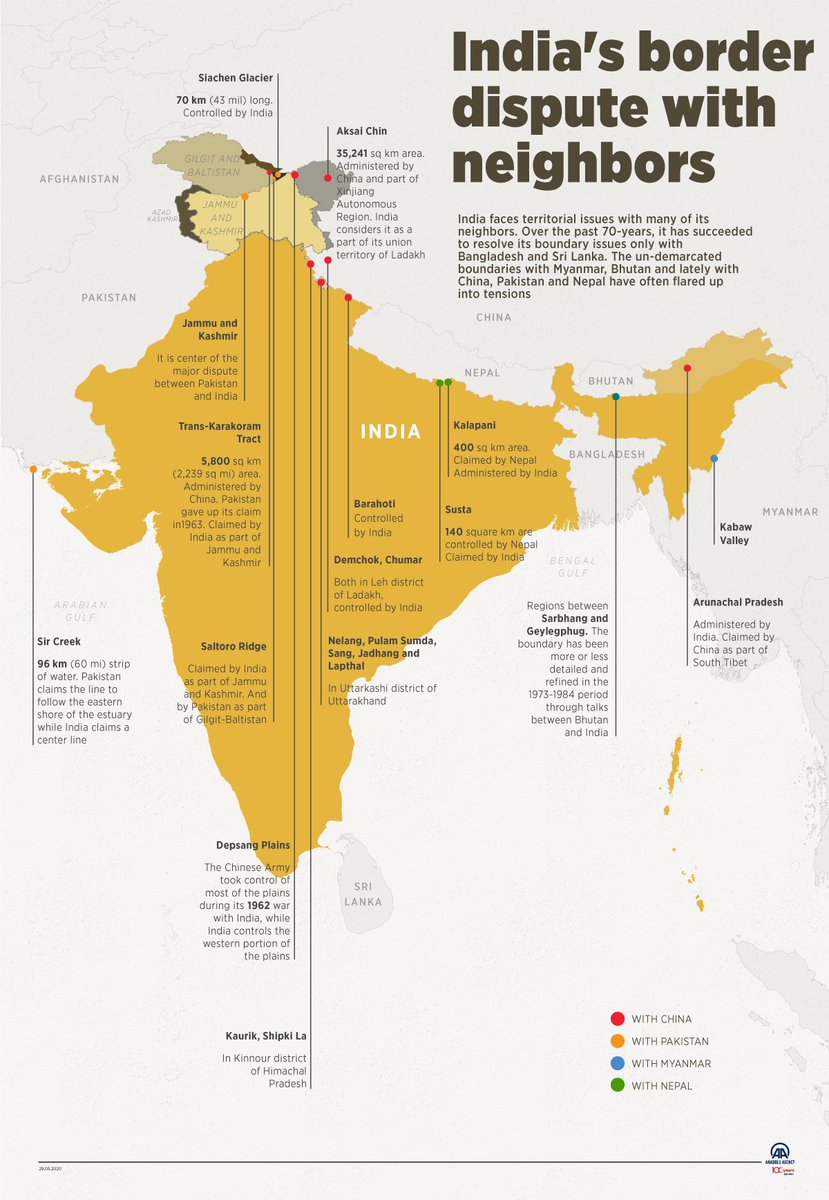 offers several examples (which is perhaps why @pstanpolitics has a popular class on the international security of South Asia)" title="What do we mean by a territorial dispute? https://abs.twimg.com/emoji/v2/... draggable="false" alt="🇮🇳" title="Flagge von Indien" aria-label="Emoji: Flagge von Indien"> offers several examples (which is perhaps why @pstanpolitics has a popular class on the international security of South Asia)" class="img-responsive" style="max-width:100%;"/>
offers several examples (which is perhaps why @pstanpolitics has a popular class on the international security of South Asia)" title="What do we mean by a territorial dispute? https://abs.twimg.com/emoji/v2/... draggable="false" alt="🇮🇳" title="Flagge von Indien" aria-label="Emoji: Flagge von Indien"> offers several examples (which is perhaps why @pstanpolitics has a popular class on the international security of South Asia)" class="img-responsive" style="max-width:100%;"/>
